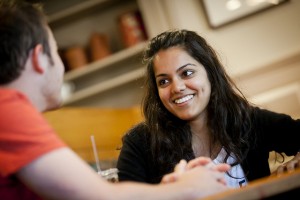
Monica Manglani ’13
By Michele Tallarita ’12
This summer, performing neurosurgery was Monica Manglani’s favorite part of the day.
A neuroscience major, Manglani ’13 (Woodbury, N.Y.) was one of 25 students from around the world selected for Cold Spring Harbor Laboratory’s Undergraduate Research Program. As part of the fully subsidized, 10-week program, she helped conduct experiments that explore how the brain recognizes sound.
Cold Spring Harbor Laboratory (CSHL), a research and education facility at the forefront of molecular biology and genetics, offers students the opportunity to learn modern lab techniques and conduct top-rate research under the tutelage of CSHL scientists.
Manglani worked at the Shea Laboratory, where she experimented with mice to learn more about how the brain encodes and integrates sensory information accurately.
“Newborn pups use ultrasonic vocalizations when distressed or cold as a survival mechanism. A mother’s recognition of this call results in the appropriate behavioral response,” Manglani says. “My project examines maternal sound selectivity in mice through optogenetics—turning on and off circuits through light.”
Essentially, she shined a light on the brain to switch on and off the neurons involved in various aspects of sound recognition. This allowed her to use other techniques to observe brain activity with and without those neurons active. “Pretty awesome?” she says.
It’s not the coolest thing she did this summer. That, she says, was when she and the other undergraduate researchers had dinner with James D. Watson, who helped discover the structure of DNA in 1953. Not only did she get to see his Nobel Prize, she discovered that he is an avid art collector and bird watcher.
Manglani hopes to follow in the footsteps of scientists like Watson, with plans to pursue dual M.D./Ph.D. degrees for a career in molecular genetics research and neurosurgery. Working with the brain would be nothing new for her, however. In addition to her experience at CSHL, she conducts EXCEL research with Lisa Gabel, assistant professor of psychology.
“Dr. Gabel has been my biggest mentor at Lafayette,” Manglani says. Together, they are studying the effects of particular genes on learning and memory, specifically on disabilities in these areas. “The lab has had great success and will be presenting at the Society for Neuroscience this year in Washington, D.C.”
Manglani has made a business of experimenting in one other laboratory: the kitchen. She’s the owner of Cakes for a Cause, a project in which she sells her own baked goods and uses the profits to sponsor underprivileged children. During summer and winter breaks from college, she’s busy whipping up vegan treats like pineapple upside-down cake to provide kids with educational opportunities, clean water, basic healthcare, and other necessities.
She was inspired to found Cakes for a Cause after her Alternative School Break trip to the Dominican Republic her freshman year, where she encountered children in poverty and resolved to do something to help.
This year, Manglani will act as the travel coordinator and team leader for Alternative School Break’s trip to Costa Rica. She’ll also be working as a committee member for Information Technology and as a teaching assistant to Elaine Reynolds, associate professor of biology.

1 Comment
Comments are closed.